内容简介:研究了一段时间的蓝牙使用,发现网上相关的资料比较贫乏,不像其他Android相关资料那么齐全,基本上大部分资料都是在蓝牙联盟SIG提供的官网Android BLE基础操作框架,基于回调,操作简单。其中包含扫描、连接、广播包解析、服务读写及通知等功能。扫描包含三种方式,第一种方式是直接扫描所有设备,可以设置循环扫描,也可以设置超时时间,扫描到的设备可以添加到
前言
研究了一段时间的蓝牙使用,发现网上相关的资料比较贫乏,不像其他Android相关资料那么齐全,基本上大部分资料都是在蓝牙联盟SIG提供的官网 https://www.bluetooth.com/zh-cn/specifications 上查找得到,也没有一个比较稳定好用的基础操作框架,开发时遇到的各种问题也是非常头疼。在此种情况下该框架应运而生,框架中包含了蓝牙设备的基础操作功能,调用简单,已通过实际项目进行验证,并且配有一个比较好用的demo演示,下文主要讲述该框架的使用方式。如果对于Android BLE还不是很了解,可以先看看我的这篇博文 Android BLE学习笔记 ,里面对于蓝牙的基础知识有详细的讲述。
Android BLE基础操作框架,基于回调,操作简单。其中包含扫描、连接、广播包解析、服务读写及通知等功能。
- 项目地址: https://github.com/xiaoyaoyou1212/BLE
-
项目引入:
compile 'com.vise.xiaoyaoyou:baseble:1.0.5'
设备扫描
使用简介
扫描包含三种方式,第一种方式是直接扫描所有设备,可以设置循环扫描,也可以设置超时时间,扫描到的设备可以添加到 BluetoothLeDeviceStore
中统一进行处理,使用方式如下:
ViseBluetooth.getInstance().setScanTimeout(-1).startScan(new PeriodScanCallback() {
@Override
public void scanTimeout() {
}
@Override
public void onDeviceFound(BluetoothLeDevice bluetoothLeDevice) {
bluetoothLeDeviceStore.addDevice(bluetoothLeDevice);
}
});
第二种方式是扫描指定Mac地址的设备,一般需设置超时时间,扫描到指定设备后就停止扫描,使用方式如下:
ViseBluetooth.getInstance().setScanTimeout(5000).startScan(new PeriodMacScanCallback() {
@Override
public void scanTimeout() {
}
@Override
public void onDeviceFound(BluetoothLeDevice bluetoothLeDevice) {
}
});
第三种方式是扫描指定广播名的设备,同第二种方式类似,也需设置超时时间,扫描到指定设备后也会停止扫描,使用方式如下:
ViseBluetooth.getInstance().setScanTimeout(5000).startScan(new PeriodNameScanCallback() {
@Override
public void scanTimeout() {
}
@Override
public void onDeviceFound(BluetoothLeDevice bluetoothLeDevice) {
}
});
其中扫描到的设备信息都统一放到 BluetoothLeDevice
中,其中包含了设备的所有信息,以下会详细讲解具体包含哪些信息。
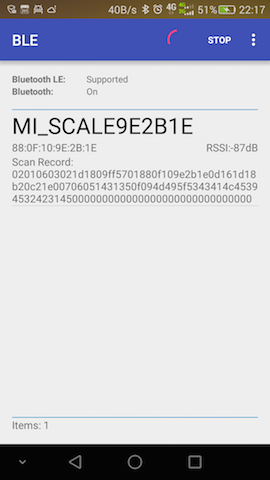
设备连接
使用简介
连接与扫描一样也有三种方式,第一种方式是在扫描获取设备信息 BluetoothLeDevice
后才可使用,可设置连接超时时间,默认超时时间为10秒,使用方式如下:
ViseBluetooth.getInstance().connect(bluetoothLeDevice, false, new IConnectCallback() {
@Override
public void onConnectSuccess(BluetoothGatt gatt, int status) {
}
@Override
public void onConnectFailure(BleException exception) {
}
@Override
public void onDisconnect() {
}
});
第二种方式是连接指定Mac地址的设备,该方式使用前不需要进行扫描,该方式直接将扫描和连接放到一起,在扫描到指定设备后自动进行连接,使用方式如下:
ViseBluetooth.getInstance().connectByMac(mac, false, new IConnectCallback() {
@Override
public void onConnectSuccess(BluetoothGatt gatt, int status) {
}
@Override
public void onConnectFailure(BleException exception) {
}
@Override
public void onDisconnect() {
}
});
第三种方式是连接指定名称的设备,该方式与第二种方式类似,使用方式如下:
ViseBluetooth.getInstance().connectByName(name, false, new IConnectCallback() {
@Override
public void onConnectSuccess(BluetoothGatt gatt, int status) {
}
@Override
public void onConnectFailure(BleException exception) {
}
@Override
public void onDisconnect() {
}
});
连接成功后就可以进行相关处理,回调已在底层做了线程切换处理,可以直接操作视图。如果知道该设备服务的UUID,可直接调用 ViseBluetooth.getInstance().withUUIDString(serviceUUID, characteristicUUID, descriptorUUID);
,那么在下面操作设备时就不需要传特征( BluetoothGattCharacteristic
)和描述( BluetoothGattDescriptor
)相关参数,如果在连接成功后一直没设置UUID,那么在操作时则需要传该参数,该内容在下文的设备操作中会详细讲解,此处就不一一讲解了。
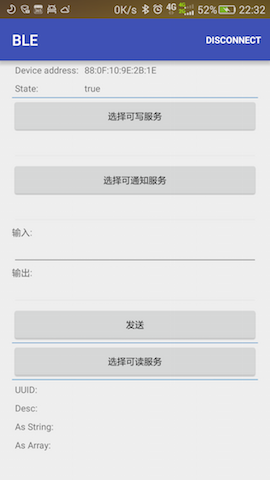
设备详情
使用简介
DEVICE INFO(设备信息)
bluetoothLeDevice.getName() bluetoothLeDevice.getAddress() bluetoothLeDevice.getBluetoothDeviceClassName() bluetoothLeDevice.getBluetoothDeviceMajorClassName() bluetoothLeDevice.getBluetoothDeviceKnownSupportedServices() bluetoothLeDevice.getBluetoothDeviceBondState()
RSSI INFO(信号信息)
bluetoothLeDevice.getFirstTimestamp() bluetoothLeDevice.getFirstRssi() bluetoothLeDevice.getTimestamp() bluetoothLeDevice.getRssi() bluetoothLeDevice.getRunningAverageRssi()
SCAN RECORD INFO(广播信息)
根据扫描到的广播包 AdRecordStore
获取某个广播数据单元 AdRecord
的类型编号 record.getType()
,再根据编号获取广播数据单元的类型描述 record.getHumanReadableType()
以及该广播数据单元的长度及数据内容,最后通过 AdRecordUtil.getRecordDataAsString(record)
将数据内容转换成具体字符串。
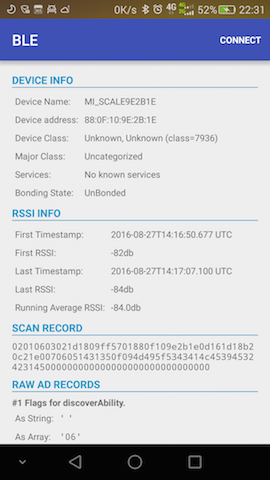
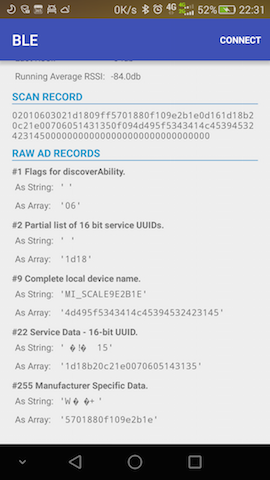
设备操作
使用简介
在操作设备前首先要保证设备已连接成功,那么在设备连接成功获取到 BluetoothGatt
后直接对服务的特征值UUID进行相关处理,其中特征值UUID有可读、可写、可通知、指示器四种,获取过程如下所示:
final String unknownServiceString = getResources().getString(R.string.unknown_service);
final String unknownCharaString = getResources().getString(R.string.unknown_characteristic);
final List<Map<String, String>> gattServiceData = new ArrayList<>();
final List<List<Map<String, String>>> gattCharacteristicData = new ArrayList<>();
mGattCharacteristics = new ArrayList<>();
// Loops through available GATT Services.
for (final BluetoothGattService gattService : gattServices) {
final Map<String, String> currentServiceData = new HashMap<>();
uuid = gattService.getUuid().toString();
currentServiceData.put(LIST_NAME, GattAttributeResolver.getAttributeName(uuid, unknownServiceString));
currentServiceData.put(LIST_UUID, uuid);
gattServiceData.add(currentServiceData);
final List<Map<String, String>> gattCharacteristicGroupData = new ArrayList<>();
final List<BluetoothGattCharacteristic> gattCharacteristics = gattService.getCharacteristics();
final List<BluetoothGattCharacteristic> charas = new ArrayList<>();
// Loops through available Characteristics.
for (final BluetoothGattCharacteristic gattCharacteristic : gattCharacteristics) {
charas.add(gattCharacteristic);
final Map<String, String> currentCharaData = new HashMap<>();
uuid = gattCharacteristic.getUuid().toString();
currentCharaData.put(LIST_NAME, GattAttributeResolver.getAttributeName(uuid, unknownCharaString));
currentCharaData.put(LIST_UUID, uuid);
gattCharacteristicGroupData.add(currentCharaData);
}
mGattCharacteristics.add(charas);
gattCharacteristicData.add(gattCharacteristicGroupData);
}
在获取到 BluetoothGattCharacteristic
后可进行如下操作:
- 设置通知服务
ViseBluetooth.getInstance().enableCharacteristicNotification(characteristic, new IBleCallback<BluetoothGattCharacteristic>() {
@Override
public void onSuccess(BluetoothGattCharacteristic bluetoothGattCharacteristic, int type) {
}
@Override
public void onFailure(BleException exception) {
}
}, false);
其中最后一个参数是设置该通知是否是指示器方式,指示器方式为有应答的通知方式,在传输时更为靠谱。如果在连接成功时已经知道该设备可通知的UUID并且已经设置成功,那么此处还可以如下设置:
ViseBluetooth.getInstance().enableCharacteristicNotification(new IBleCallback<BluetoothGattCharacteristic>() {
@Override
public void onSuccess(BluetoothGattCharacteristic bluetoothGattCharacteristic, int type) {
}
@Override
public void onFailure(BleException exception) {
}
}, false);
- 读取信息
ViseBluetooth.getInstance().readCharacteristic(characteristic, new IBleCallback<BluetoothGattCharacteristic>() {
@Override
public void onSuccess(BluetoothGattCharacteristic bluetoothGattCharacteristic, int type) {
}
@Override
public void onFailure(BleException exception) {
}
});
同上,如果已设置过可读的UUID,那么此处也可以通过如下方式读取信息:
ViseBluetooth.getInstance().readCharacteristic(new IBleCallback<BluetoothGattCharacteristic>() {
@Override
public void onSuccess(BluetoothGattCharacteristic bluetoothGattCharacteristic, int type) {
}
@Override
public void onFailure(BleException exception) {
}
});
- 写入数据
ViseBluetooth.getInstance().writeCharacteristic(characteristic, new byte[]{0x00,0x01,0x02}, new IBleCallback<BluetoothGattCharacteristic>() {
@Override
public void onSuccess(BluetoothGattCharacteristic bluetoothGattCharacteristic, int type) {
}
@Override
public void onFailure(BleException exception) {
}
});
同样,如果在连接成功时设置过可写UUID,那么此处也可以通过如下方式写入数据:
ViseBluetooth.getInstance().writeCharacteristic(new byte[]{0x00,0x01,0x02}, new IBleCallback<BluetoothGattCharacteristic>() {
@Override
public void onSuccess(BluetoothGattCharacteristic bluetoothGattCharacteristic, int type) {
}
@Override
public void onFailure(BleException exception) {
}
});
此处的数据 new byte[]{0x00,0x01,0x02}
为模拟数据,在使用时替换为真实数据即可,切记每次发送的数据必须在20个字节内,如果大于20字节可采用分包机制进行处理。
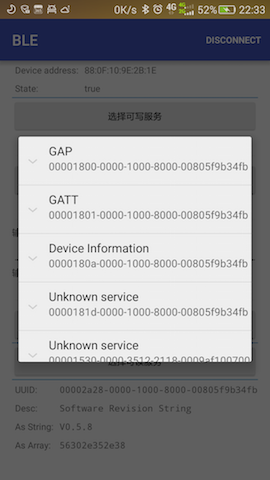
从以上的描述中可以知道,设备相关的所有操作都统一交给 ViseBluetooth
进行处理,并且该类是单例模式,全局只有一个,管理很方便。使用前必须要在Application中调用 ViseBluetooth.getInstance().init(this);
进行初始化,在连接设备成功时会自动获得一个 BluetoothGatt
,在断开连接时会将该 BluetoothGatt
关闭,上层不用关心连接数最大为6的限制问题,只需要在需要释放资源时调用 ViseBluetooth.getInstance().clear();
就行,简单易用,这也正是该项目的宗旨。
在此要感谢两位作者提供的开源库 https://github.com/litesuits/android-lite-bluetoothLE 和 https://github.com/alt236/Bluetooth-LE-Library—Android ,这两个开源库对于本项目的完成提供了很大的帮助。
以上就是本文的全部内容,希望本文的内容对大家的学习或者工作能带来一定的帮助,也希望大家多多支持 码农网
猜你喜欢:- SQLAlchemy框架用法详解
- OSGi模块化框架详解
- Android组件化框架项目详解
- Hadoop 框架:DataNode 工作机制详解
- Lararel 框架执行流程详解(1) 入口文件
- 模仿hibernate框架,详解hibernate部分方法设计
本站部分资源来源于网络,本站转载出于传递更多信息之目的,版权归原作者或者来源机构所有,如转载稿涉及版权问题,请联系我们。
数据库系统概念
Abraham Silberschatz、Henry F. Korth、S. Sudarshan / 杨冬青、马秀莉、唐世渭 / 机械工业 / 2006-10-01 / 69.50元
本书是数据库系统方面的经典教材之一。国际上许多著名大学包括斯坦福大学、耶鲁大学、得克萨斯大学、康奈尔大学、伊利诺伊大学、印度理工学院等都采用本书作为教科书。我国也有许多所大学采用本书以前版本的中文版作为本科生和研究生的数据库课程的教材和主要教学参考书,收到了良好的效果。 本书调整和新增内容:调整了第4版的讲授顺序。首先介绍SQL及其高级特性,使学生容易接受数据库设计的概念。新增数据库设计的专......一起来看看 《数据库系统概念》 这本书的介绍吧!




